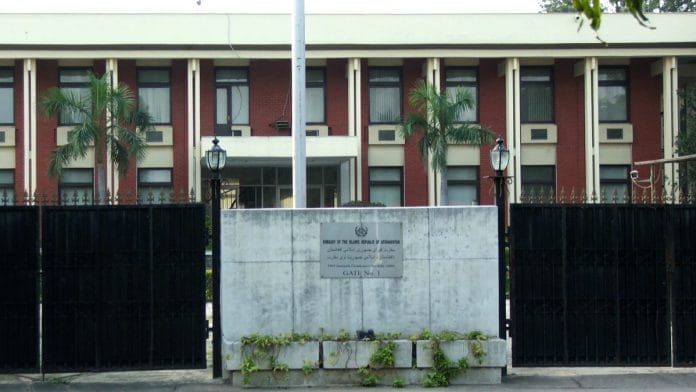New Delhi: The visa of Qadir Shah, the man “appointed” by the Taliban to run the Afghan embassy in New Delhi as chargé d’affaires, expired two weeks ago, ThePrint has learnt, and it remains unclear whether the Indian government will extend it.
This further complicates the ongoing power struggle in the Afghan embassy between those appointed by the previous democratic government and the Taliban regime, both of whom appear keen for the Indian Ministry of External Affairs (MEA) to intervene. Confirming the development to The Times of India last week, the chief of Taliban’s political office in Doha, Suhail Shaheen, had called Shah’s “appointment” a rational move.
Shah has worked for the embassy since 2020 and served as the trade councillor, but since controversy erupted over his appointment earlier this month, has not been allowed to enter the mission.
According to a document seen exclusively by ThePrint, Shah was granted a visa extension by the Indian government on 13 May 2022 which expired on 12 May 2023.
ThePrint contacted Shah over the phone who refused to either confirm or deny the expiration of his visa, besides questions about its extension.
ThePrint also contacted the MEA spokesperson who did not provide a response. Since the controversy began, the MEA has reportedly chosen not to take sides and is letting the “internal matter” play out.
According to the process followed by MEA’s Consular, Passport and Visa Division (CPV), the extension of a diplomatic visa requires a note verbale (diplomatic note) from the embassy to which the applicant is attached.
Diplomatic sources confirmed that the Afghan embassy in Delhi sent a letter to the MEA earlier this month informing that Shah’s services had been terminated.
Also Read: US embassy to offer more student visa appointment slots this year, fee increased by Rs 2,000
Ripples in Indian foreign policy
The Indian government has yet to formally recognise the Taliban regime but maintains a “technical” team in Kabul. The Taliban, meanwhile, has reportedly placed its officials in 14 missions around the world, including in China and the UAE.
As early as January, ThePrint reported that the Taliban had begun pushing India to allow it to station a representative in New Delhi and controversial figure Abdul Balkhi’s name was among those floated. Balkhi faced criticism for his views on women’s rights and was accused of threatening to kill an Australian journalist for reportage hostile to the Taliban in the aftermath of the fall of the elected Ashraf Ghani-led government in Kabul.
ThePrint reached experts to ascertain whether the issue surrounding Shah’s visa has the potential to affect India’s foreign policy towards Afghanistan.
There were mixed reactions.
According to former Afghan diplomat Zardasht Shams, granting Shah a visa extension would mean “semi-recognition” of the Taliban regime in Kabul.
“Not extending the visa would mean there is no major change in the Indian government’s policy towards the Taliban, at least towards their recognition. However, if granted, then it would mean some sort of understanding is being made in the background with the Taliban,” Shams told ThePrint.
However, a former Indian ambassador to Afghanistan who did not wish to be named, argued the opposite, saying extension of visas for diplomats is “routine”.
“When it comes to Afghan nationals, it is routine in India for their visas to be extended or renewed, especially for diplomats. If MEA has extended Shah’s visa, it could be seen as part of the common process whereas not extending the visa would send a clear message to the Taliban,” said the former diplomat.
The two further explained that the way MEA has handled the situation in the Afghan embassy so far is very much in line with India’s current foreign policy of being “tactical” and “opportunistic” when it comes to regime changes in the neighbourhood and beyond.
(Edited by Amrtansh Arora)
Also Read: Australia, India to seek closer economic ties, critical minerals cooperation






